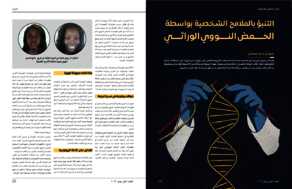Document
الحمض النووي DNA وأثره في الإثبات الجنائي.
Source
مجلة الدراسات الفقهية والقانونية. ع. 13. ص. 1-30.
Contributors
الطائي، عبد الغفور صالح محمد., Author
السنيدي، سند سيف محمد., Author
Other titles
The Impact of DNA in Criminal Proof.
Country
عمان.
City
نزوى
Publisher
المعهد العالي للقضاء
Gregorian
2023
Language
Arabic
English abstract
No one can deny the positive role that the scientific developments and the modern technology have played within the framework of the criminal law, especially with regard to the proof as a theory and its role in detecting the crimes and capturing the criminals, out of these scientific developments is the human footprint (DNA) and its assumed role in proving the crimes. If all criminal legislation agreed on the use of the fingerprints, the audio and eye print, then the query about the possibility of using the DNA in proving or disproving the criminal cases might be raised. If we assume that it is permissible to use it, then this calls into another question, whether the DNA is considered a conclusive evidence in the field of criminal evidence or is it one of the supporting evidence for existing evidence? Where the importance of proof is considered as the means used by the judge to reach the required truth, because the disputed cases are of no value if there is no comprehensive objective evidence of legal action that is referred to prove or deny this right. This study aims at demonstrating the importance of the DNA and its legal adaptation in terms of cut out proof or to consider it as a consort with. To accomplish the objectives of the present study, its methodology is based on descriptive analysis as a basic method in order to reach the following results; first, the DNA footprint is a unique map for everyone. Second, it cannot be changed over time. Third, it can be extracted from the person even after his death. Forth, it is also a clear and conclusive evidence that the person concerned is present at the crime scene.
ISSN
2706-882X
Hijri
1444
Arabic abstract
لا يمكن لأحد أن ينكر الدور الإيجابي الذي لعبته التطورات العلمية والتكنولوجية الحديثة في إطار القانون الجنائي، خصوصاً ما يتعلق بنظرية الإثبات ودورها في مجال كشف الجرائم والتوصل إلى المجرمين، من هذه التطورات العلمية البصمة الوراثية للإنسان الحمض النووي (DNA)، ودوره المعترض في إثبات الجرائم، فإذا كانت جميع التشريعات الجنائية متفقة على جوار الاستعانة ببصمات الأصابع والصوت والعين، فإن التساؤل يثار حول إمكانية الاستعانة بالحمض النووي DNA في الإثبات أو النفي الجنائي من عدمه، وإذا فرضنا جواز الاستعانة به، فإن ذلك يدعو للتساؤل فيما إذا كان الحمض النووي DNA يعد من الأدلة القاطعة في مجال الإثبات الجنائي أم أنه من الأدلة المساندة لأدلة قائمة بالفعل.
تهدف هذه الدراسة إلى بيان أهمية الحمض النووي وتكييفه القانوني من حيث قطعية الإثبات أم عده من القرائن؛ حيث تتمثل أهمية الإثبات باعتباره الوسيلة التي يستخدمها القاضي للوصول إلى الحقيقة المطلوبة، لأن القصايا المتنازع عليها ليست ذات قيمة إذا لم يكن هناك دليل موضوعي منتج وشامل للتصرف القانوني يتم الرجوع إليه لإثبات هذا الحق أو إنكاره، ولغرض تحقيق أهداف الدراسة تمثل منهجها بالاعتماد على التحليل الوصفي كمنهج أساسي لهذه الدراسة. من أجل الوصول إلى النتائج التي تتمثل أهمها بأن بصمة الحمض النووي DNA هي خارطة فريدة يتميز بها كل فرد عن غيره، وهي لا تتغير ولا تتشوه مع مرور الزمن ويمكن استخلاصها من الشخص حتى بعد مماته، كما أنها تعد دليل واضح وقاطع على وجود الشخص المعني في مكان الجريمة.
تهدف هذه الدراسة إلى بيان أهمية الحمض النووي وتكييفه القانوني من حيث قطعية الإثبات أم عده من القرائن؛ حيث تتمثل أهمية الإثبات باعتباره الوسيلة التي يستخدمها القاضي للوصول إلى الحقيقة المطلوبة، لأن القصايا المتنازع عليها ليست ذات قيمة إذا لم يكن هناك دليل موضوعي منتج وشامل للتصرف القانوني يتم الرجوع إليه لإثبات هذا الحق أو إنكاره، ولغرض تحقيق أهداف الدراسة تمثل منهجها بالاعتماد على التحليل الوصفي كمنهج أساسي لهذه الدراسة. من أجل الوصول إلى النتائج التي تتمثل أهمها بأن بصمة الحمض النووي DNA هي خارطة فريدة يتميز بها كل فرد عن غيره، وهي لا تتغير ولا تتشوه مع مرور الزمن ويمكن استخلاصها من الشخص حتى بعد مماته، كما أنها تعد دليل واضح وقاطع على وجود الشخص المعني في مكان الجريمة.
Category
Journal articles







